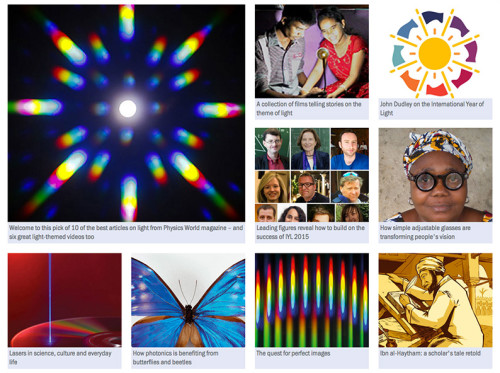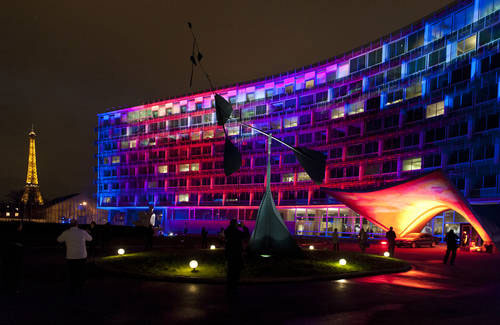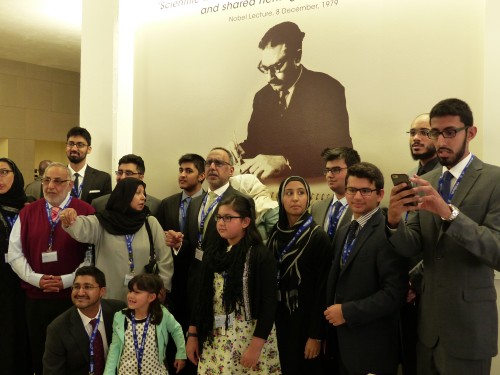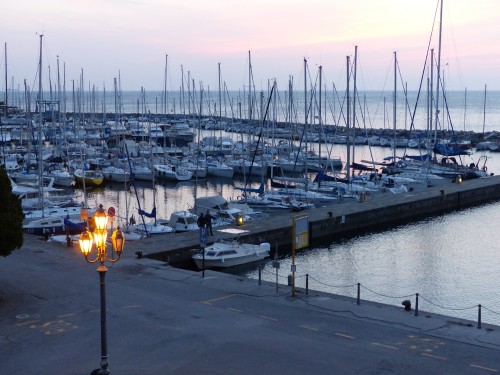Tag archives: developing world
International Year of Light 2015: our top 10 articles on light now with added videos

Celebrate IYL 2015 with a special free-to-read digital edition of Physics World – now updated to include light-themed films and a look ahead to the legacy the year will leave.
By Matin Durrani
We’re now in the final quarter of the International Year of Light (IYL 2015), which officially launched in January at the headquarters of the UN Educational, Scientific and Cultural Organization (UNESCO) in Paris. You may remember that on the very same day Physics World unveiled its own contribution to the IYL in the form of a free-to-read digital edition containing 10 of our very best feature articles on the science and applications of light.
Today we’re pleased to publish a new version of that digital edition, which contains the same 10 top articles but now includes a series of great videos and a podcast on the theme of light that we’ve been busy creating over the last few months. The refreshed digital edition also has interviews with some of the people involved in the IYL, in which they highlight some of the successes of the year so far and examine the legacy the IYL will leave behind. Click here to find out more.
Personal views on the International Year of Light
By James Dacey
“In the beginning there was light – the Big Bang,” said Steve Chu, talking on Monday at the UNESCO headquarters in Paris during the opening ceremony of the International Year of Light and Light-based Technologies (IYL 2015). Chu – a Nobel-prize winner and former US energy secretary – was among a smorgasbord of speakers at the two-day event, which brought together scientists, artists, politicians and many others with a particular interest in light and its applications.
Being a journalist, I was at the event with my own light-based technology, the humble SLR camera. I was recording a series of interviews with people at the event, including Chu, to get their thoughts on what the year of light means to them. As I’ve mentioned in a previous article, the fact that “light” is such an all-encompassing theme can also make it difficult to get a handle on what IYL 2015 is all about. I hope that the resulting video – to be published on physicsworld.com next week – will bring clarity to some of the initiatives and projects in the spotlight this year.
Paris ushers in the International Year of Light

The art installation “Light is Here” by Finnish artist Kari Kola projected onto UNESCO’s Paris headquarters. (Courtesy: UNESCO/Nora Houguenade)
By Matin Durrani in Paris
It was a grey and dank morning yesterday in the French capital, with even the top of the Eiffel Tower shrouded in clouds – perhaps not the most auspicious weather for the official opening ceremony of the International Year of Light and Light-based Technologies (IYL 2015) here at the headquarters of the UN Educational, Scientific and Cultural Organization (UNESCO).
Inside the conference hall, however, all was brightly lit. The stage was bathed in beams of light in all the colours of the rainbow as the 1500 or so delegates first watched an official IYL 2015 video and then listened as a series of dignitaries voiced their backing for the initiative.
These included a message of support from UN director-general Ban Ki-moon read out by an official and a video recording from Irina Bokova, UNESCO director-general. There were also speakers from Ghana, Mexico, New Zealand, Russia and Saudi Arabia – the five nations that took a key role in getting IYL 2015 approved by the UN in late 2013.
How to inspire scientists in developing nations
By Matin Durrani
I’ve now returned to the UK from my visit to the International Centre for Theoretical Physics (ICTP) in Trieste, which has been celebrating the 50th anniversary of its founding. As part of those celebrations, the ICTP has created a special half-hour video documentary (above), which shows how scientists in various parts of the globe have not only furthered their own careers through visits to the ICTP, but have also used that experience to improve science back in their home countries
The video, which I watched in Trieste, features scientists from everywhere from Nepal to Cuba, from Ethiopa to Peru, and from Cameroon to China – and, of course, Pakistan itself where the ICTP’s founder Abdus Salam was from. Entitled From Theory to Reality: ICTP at 50, it was made by Italian film-maker Nicole Leghissa, who spent two months travelling around the world to the locations seen in the film.
Who was the real Abdus Salam?

Honouring his achievements – members of Abdus Salam’s family at the International Centre for Theoretical Physics in Trieste.
Matin Durrani in Trieste, Italy
It’s now my third day here at the International Centre for Theoretical Physics (ICTP) in Trieste, which is celebrating its 50th anniversary in grand style. Two days ago we had a marvellous seven-course dinner at Duino Castle, including a hugely spectacular fruit-laden golden-jubilee cake, while yesterday there was a possibly even more sumptuous eight-course dinner hosted by the city that has been home to the centre for half a century.
But pervading all the events has been Abdus Salam, the Pakistani Nobel-prize-winning theoretical physicist who set up the centre in 1964. We know pretty much what Salam did from a scientific point of view, which was celebrated in his 1979 Nobel prize for unifying the weak and electromagnetic forces, but what exactly was he like as a person?
All eyes on the ICTP as it turns 50

Golden days: the view from the guesthouse at the International Centre for Theoretical Physics as delegates arrive for a conference to mark its first 50 years.
By Matin Durrani in Trieste, Italy
When the Pakistani physicist Abdus Salam founded the International Centre for Theoretical Physics (ICTP) here in Trieste in 1964, I am sure he would have never quite dared to believe that it would go on to be such a success in helping to further the careers of some of the brightest minds from the developing world. Salam’s dream was for the ICTP to be a focal point for talented theorists from countries seeking to build up their research strengths, bringing such people into contact with leading physicists from front-ranking nations to carry out top-quality collaborative projects.
Now, 50 years after it began, the ICTP is hosting a golden-jubilee conference, where it is quite rightly celebrating all that it has achieved – and looking ahead to the future too.